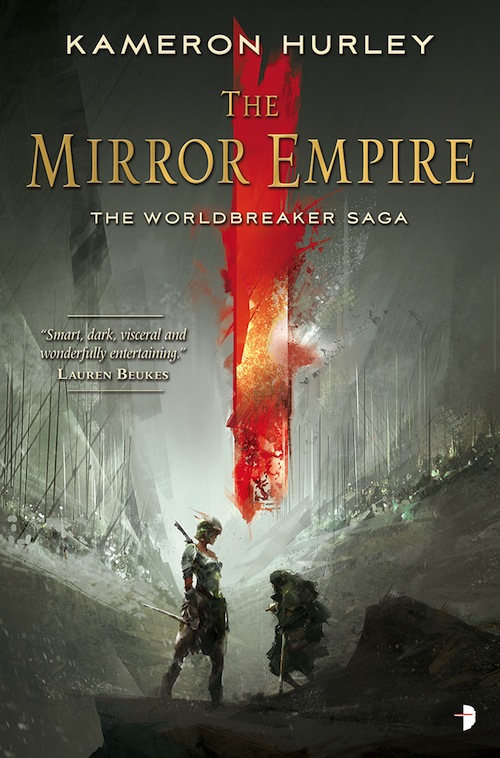Kameron Hurley’s nonfiction writing recently won awards in two separate categories at this year’s Hugo ceremony (Best Fan Writer and Best Related Work, to be exact). Her first science fiction novel, God’s War, was shortlisted for, among others, the Arthur C. Clarke Award and the BSFA Award. The Bel Dame Apocrypha trilogy (God’s War, Infidel, and Rapture) heralded the arrival of new, uncompromising voice in the SFF field. Hurley’s first outings proved her ability to innovate: to mix really weird elements of worldbuilding with visceral brutality and strong characterisation, in stories that have interesting arguments about social change, war, and survival at their core.
Stories with a deeply, angrily, feminist vein.
The Mirror Empire takes what Hurley’s already shown us she’s capable of with regard to science fiction, and applies it to the vast canvas of epic fantasy. This isn’t the epic fantasy we’re all used to, though, recognisably inspired by cultures from our own history—and that mostly northern European ones. No: this is epic fantasy that builds its world from the ground up, and that world is deeply, fascinatingly weird.
It becomes apparent early on that there isn’t just one world, either. There are parallel worlds, alternate realities, which are coming closer to each other. This approach—this ability to travel between (so far two) realities—is connection to the rising of Oma, the dark star. For magic in the world of The Mirror Empire is connected to the ascent and descent of satellites. When a specific satellite is in ascendance, those born gifted with the right talents can draw on the power of the satellite, but the satellites rise and fall over the course of years and at uncertain intervals. Oma has not been rising for several hundred years, and the last time it rose—every time it has risen—it has been accompanied by war and devastation on a grand scale, although the records of the previous time are scattered and for the most part destroyed.
It is not only in magic that Hurley displays her imagination, however, but in the flora and fauna of The Mirror Empire. The forests of The Mirror Empire are harsh places, dangerous, filled with carnivorous and poisonous plants—many of which are unusually mobile. One of the main characters, the temple servant Lilia, loses part of her foot to acid from a plant during a battle in her childhood.
There are a great many characters in The Mirror Empire. It’s a book I thoroughly enjoyed, but there’s no question that it involves a great many narrative threads, all of which demand you hit the ground running and keep up. This makes for a confusing beginning, and the presence of several significant viewpoint characters means that the pacing seems rather slow to start. But Hurley’s characterisation is sufficiently interesting, her prose style sufficiently muscular and gripping, to carry me along—and once The Mirror Empire gets its feet under it, it starts to bring things together with verve and panache and violent brutality and genocide and invasion.
Ahkio is the first man, and the first ungifted person, to inherit the leadership of the independent Dhai people, a nation of pacifists with limited central authority. But his sister’s death was anything but natural: his rule is threatened from both within and without, and he may not be able to rely on his advisors to steer him through the perils ahead. Roh is a young, gifted Dhai student who desperately wants to be a fighter. Sent to the warlike Saiduan as part of a delegation of scholars who are searching for scraps of information that might stop the horde of invaders that have all but overrun the Saiduan nation, he may achieve his goal—but not without great cost. Zezili is a Dorimah general, half-Dhai in ancestry in an empire where the Dhai are slaves, whose empress has set her under the command of strangers and tasked her to exterminate the Dhai. Taigan is a Saiduan gifted, who can draw on the powers of Oma and whose body changes between outwardly male and outwardly female attributes at unpredictable intervals, who has been bound to bring others who can draw on Oma back to Saiduan.
But the narrative thread which does most to unite the novel’s disparate arcs is Lilia’s. Brought between realities as a child, her presence or its echoes connect the other viewpoint characters. She grows from a child not knowing her own importance to a young woman determined to make her own choices—and to use those choices to protect others.
I really enjoyed The Mirror Empire. It’s a vivid, visceral, imaginative entry in the epic fantasy stakes, one that’s doing interesting things with society, culture, and gender and gender roles. With lots of BOOM—Hurley, on form, doesn’t hesitate to kick you in the throat just to get your attention. But it’s far from a perfect book. The absence of a single strong narrative thread means that the reader doesn’t have the information to build a solid picture of what’s happening until relatively late in the story, and the structure feels somewhat awkward, as though there are five litres of plot in a two litre jug. In that respect, it reminds me of a faster, weirder Steven Erikson novel. LOTS OF THINGS HAPPEN. Many of them are alternately awesome and shocking, fascinating and weird.
Is it an entertaining book? Absolutely. Is it a good book? Well, I want the bloody sequel already, and I’ll withhold my judgement on its technical successes until I can read the story’s end.
Give me the sequel soon, okay? Or somebody’s going to get hurt…
The Mirror Empire publishes Aug 26th in the US and Sept 4th in the UK by Angry Robot.
Read an excerpt from the novel here on Tor.com, and listen to the Rocket Talk podcast episode featuring Kameron Hurley and Liz Bourke.
Liz Bourke is a cranky person who reads books. Her blog. Her Twitter.










